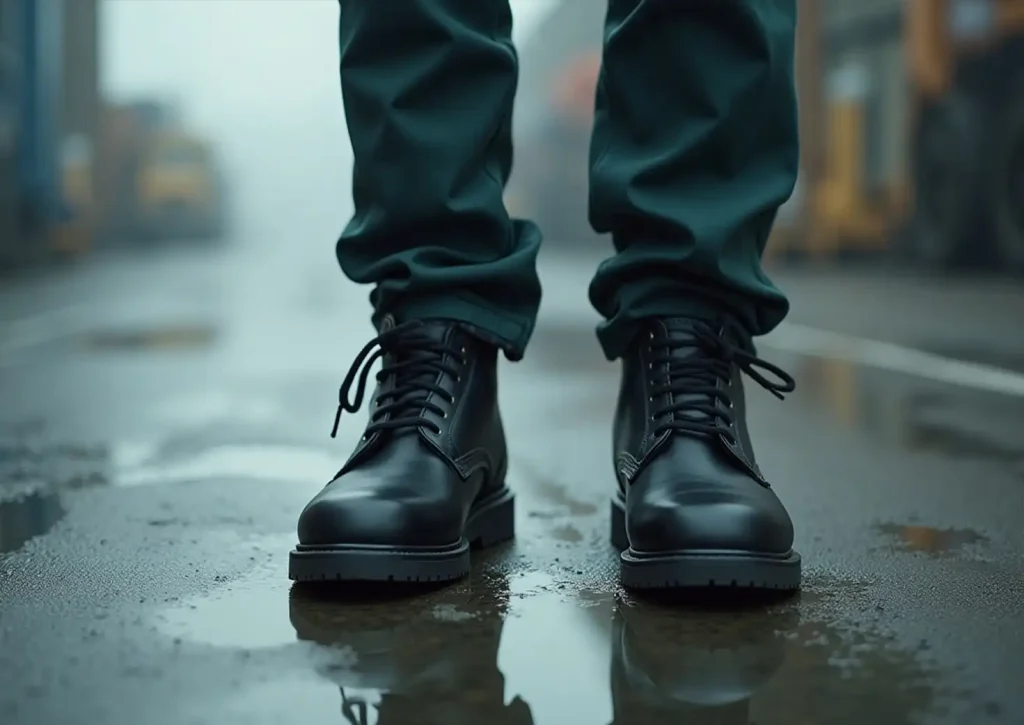Can Safety Shoes Be Waterproof? What You Need to Know
When it comes to working in environments where water, spills, or wet conditions are common, keeping your feet dry isn’t just about comfort—it’s about safety. Wet feet can lead to discomfort, blisters, and even more severe issues like fungal infections. Plus, waterlogged shoes can compromise the structural integrity of the footwear, reducing their protective capabilities. So, the big question is: Can safety shoes be waterproof? Let’s dive into what you need to know.
Understanding Waterproof Safety Shoes
Yes, safety shoes can indeed be waterproof. Manufacturers design these shoes using materials and construction techniques that prevent water from penetrating the shoe’s interior. This ensures that your feet remain dry even in wet working conditions.
Key Features of Waterproof Safety Shoes:
- Waterproof Membranes: Many waterproof safety shoes incorporate specialized membranes that block water from entering while allowing moisture from sweat to escape. This dual action keeps your feet dry from both external water and internal perspiration.New York Magazine
- Sealed Seams: To further enhance water resistance, manufacturers seal the seams of the shoes, preventing water from seeping through the stitching.
- Water-Resistant Materials: Materials like treated leather or synthetic composites are often used for their inherent water-resistant properties.
Benefits of Waterproof Safety Shoes
Investing in waterproof safety shoes offers several advantages:
- Enhanced Comfort: Dry feet are comfortable feet. By keeping moisture out, these shoes help prevent blisters and other discomforts associated with wet conditions.
- Improved Safety: Wet environments can be slippery. Many waterproof safety shoes also feature slip-resistant soles, providing better traction on slick surfaces.
- Durability: Waterproof shoes are often more durable in wet conditions, as they’re designed to withstand the challenges of such environments without degrading quickly.
Choosing the Right Waterproof Safety Shoes
When selecting waterproof safety shoes, consider the following factors:
- Work Environment: Assess the specific conditions of your workplace. For instance, construction sites may require steel toe caps for impact protection, while electrical environments might benefit from composite toe caps to reduce electrical conductivity.
- Material: Leather is a popular choice for its durability and natural water resistance, especially when treated. Synthetic materials can also offer excellent waterproofing and may be lighter.
- Fit and Comfort: Ensure the shoes fit well and provide adequate support for long hours on your feet. Look for features like cushioned insoles and ergonomic designs.
- Certifications: Check for safety certifications relevant to your industry to ensure the shoes meet necessary protection standards.
Maintaining Your Waterproof Safety Shoes
To prolong the life and effectiveness of your waterproof safety shoes:
- Regular Cleaning: Remove dirt and debris after each use. Use a damp cloth for surface cleaning and allow them to air dry naturally.
- Conditioning: For leather shoes, apply a suitable conditioner periodically to maintain suppleness and water resistance.
- Inspection: Regularly inspect your shoes for signs of wear, such as cracks or sole separation, and address issues promptly.
Where to Find Quality Waterproof Safety Shoes
For a range of high-quality waterproof safety shoes, consider exploring Mittal Safety Works. We offer various options tailored to different industries and needs.
FAQs
Q: Are all safety shoes waterproof?
A: No, not all safety shoes are designed to be waterproof. It’s essential to check the product specifications to ensure they meet your water resistance needs.
Q: Can I make my existing safety shoes waterproof?
A: While you can apply waterproofing sprays or treatments to enhance water resistance, these solutions may not be as effective as shoes specifically designed to be waterproof.
Q: Do waterproof safety shoes compromise on breathability?
A: High-quality waterproof safety shoes are designed with breathable membranes that allow moisture from sweat to escape while keeping external water out, maintaining comfort during extended wear.
Q: How often should I replace my waterproof safety shoes?
A: The lifespan depends on usage and care. Regularly inspect your shoes for wear and replace them when they no longer provide adequate protection or comfort.
Q: Are waterproof safety shoes more expensive?
A: They can be slightly more expensive due to the specialized materials and construction techniques used. However, the investment is often worthwhile for the added comfort and protection in wet conditions.
In conclusion, waterproof safety shoes are a valuable investment for those working in wet or unpredictable environments. They provide the necessary protection to keep your feet dry, comfortable, and safe, enabling you to perform your duties effectively.



